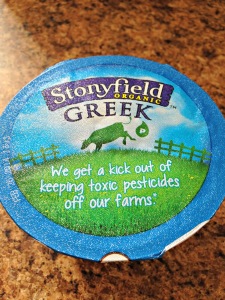The other day I went grocery shopping at a store that is not one of my two usuals. Everything was going fine, uneventful, maybe even a little dull, you know – grocery shopping – until, I was struck immobile in the yogurt section.
I was literally wandering up and down the seven feet of yogurt products while working through an internal struggle. You see, my usual choice for my kids is Chobani Champions in the tube; a Greek yogurt because of the additional protein and a tube because it’s fun. Of course, this particular store did not carry the Champions yogurt, though it did have several choices: regular and lowfat traditional yogurt, greek yogurt, kids-themed yogurt, serious “indulgent” adult yogurts, and of course, Stonyfield organic yogurt and all its offerings including its “YoBaby” and “YoKids” – the only other choice in a tube.
Up until this point, I was very much anti-Stonyfield yogurt. In fact, truth be told, I am anti- most organic products unless it is grown by someone that I know. You see, while I appreciate choice in our food industry, I don’t appreciate misleading marketing efforts that feed into an often irrational fear of our safest food supply in history; particularly when it’s just to make a buck. But on this specific day, I decided to test myself to see if I was willing to make a concession for the sake of the “tube” and the delight of my children, albeit a two minute delight. After a solid five minutes of deliberation, I found that I was not and I am glad that I did not give in.
The very next day, my decision felt further justified as one of the Twitter accounts that I follow shared the top to a Stonyfield yogurt – one I som ehow missed during my yogurt examination – with a comment “Marketing at its finest. Come on. #cantweallgetalong.” Amen sister. (picture at right)
ehow missed during my yogurt examination – with a comment “Marketing at its finest. Come on. #cantweallgetalong.” Amen sister. (picture at right)
The problem with this label is that organic farms are allowed to and do use “toxic” pesticides. The difference is, they are not allowed to use “synthetic” pesticides. I know this already because of my involvement in farming, but was also happy to read a recent article on slate.com that addresses pesticide residue in fruits and vegetables written by a mommy-blogger. The author, a non-farmer, took task to find the actual numbers behind pesticide residue in produce farmed organically versus conventionally, because like many others, she had been led to believe that harmful residues in conventional produce was not good for her son. What she found was far from her initial belief, no doubt created in part by crafty product marketing. Her conclusion was, though you may have other reasons to purchase organic produce, when it comes to pesticide residue, “Conventional fruits and vegetables are perfectly healthy for kids.”
The thing is, this trust-eroding-though-we-think-we’re-building-trust-in-our-BRAND advertising strategy (ala many other big-food companies like Panera and Chipotle as well) is not coming from the organic farmers. It’s coming from a marketing department removed from what’s actually happening on the farm and obviously what the national organic standards are in the U.S. What strikes me ironically is that Stonyfield recently had an initiative to recruit more conventional dairy farms to become organic-certified and sell milk to them directly, all the while their marketing department continues to piss their so-called recruits right off.
I know a lot of organic farmers. Some are even great friends. And while I respect their decision to farm organically, I don’t agree with all of their practices, just as I am sure the pendulum swings both ways. But I do know that we all care for our animals and the land to the best that we can and that alone builds a level of commonality. Trouble comes when the people using labels and other advertising to sell farm products for their food company pit us against each other. And while we do have the safest food supply in history, that in no way means that there isn’t room for improvement, innovation and still more choices.
